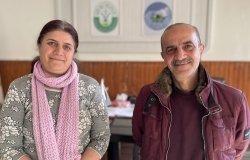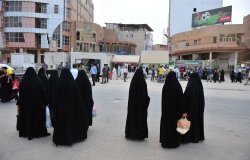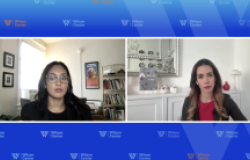Confronting the Crisis: Women and AIDS
Experts address women's particular vulnerability to HIV/AIDS, the disease's impact on family livelihoods, and women's role in prevention programs.
Overview
What is the role of women in combating the global HIV/AIDS pandemic? What policies and programs are most relevant and effective in decreasing women's vulnerability to infection? How is the UN system addressing the deep cultural chauvinisms that affect AIDS-related issues like family planning and domestic violence?
At "Confronting the Crisis: Women and AIDS," held on November 10 at the Woodrow Wilson International Center for Scholars, UNAIDS Deputy Director Dr. Kathleen Cravero and former U.S. Assistant Secretary of State for African Affairs George Moose kicked off the first in a three-part, high-level briefing series jointly sponsored by UNAIDS and the Woodrow Wilson International Center for Scholars. The series, which will feature UNAIDS' Executive Director Dr. Peter Piot on November 30, seeks to expand awareness of the global AIDS agenda outside of the health community, especially within U.S. foreign policy and development circles. Anne Peterson of USAID's Global Health Bureau introduced the meeting's main themes: women's particular vulnerability to HIV/AIDS, the disease's impact on family livelihoods, and women's role in prevention programs.
Dr. Kathleen Cravero, deputy executive director of UNAIDS, described the disproportionate impact of HIV/AIDS on women in both developed and developing countries:
Sixty percent of all the people with HIV in sub-Saharan Africa are women—almost half worldwide. Seventy-five percent of young people with HIV in South Africa are girls. In Kenya, for every 10 young men with HIV, there are 45 young women with the virus. In Brazil, the number of new AIDS cases among women increased by 75 percent in the late 1990s, compared to just 10 percent among men. And in America, the leading cause of death among African American women ages 25-34 is AIDS. The disproportionate infection of millions of poor women isn't merely an injustice; it is a socio-economic disaster.
This looming socio-economic disaster is correlated with women's vital roles as food producers, mothers, and caretakers of the sick. In Dr. Cravero's words, "Women are the backbone holding together the fabric of society," and thus ensuring women's well-being is the most urgent, and most effective, intervention point in the global struggle against the AIDS epidemic.
ABC Plus
Dr. Cravero praised the ABC model—Abstain, Be Faithful, Use Condoms—as a good start, but noted that such methods are insufficient to stem the tide of AIDS infections in women. Women are infected at a higher rate than men not only due to a lack of information, but because "they don't have the social and economic power—they don't have the options—they need to keep themselves safe." Dr. Cravero explained the harsh realities confronted by women in many areas of the world. Abstention can fail because girls are sometimes forced into exploitative sexual relationships at a young age for economic reasons. Encouraging faithfulness is an ineffective strategy if male partners are unfaithful and refuse to wear condoms. In the words of Dr. Cravero, many of the ways that women contract HIV "stem from one stark reality—that women lack control over their bodies and their daily lives, and the tools, resources, and support needed to change their situation."
Prevention and intervention measures, therefore, must go beyond "quick fixes" to challenge "long-standing but now fatal laws, customs, and traditions. It means changing the way the world works—and the way we do business." Dr. Cravero introduced the Global Coalition on Women and AIDS, an initiative recently launched under the leadership of UNAIDS. This unique coalition "is rooted in concrete action in areas vital to women's well-being." The initiative's highlight is a broader set of HIV prevention strategies dubbed "ABC Plus" since it expands upon the ABC program.
Reducing violence against women is a top priority within this expanded program. Dr. Cravero noted that fear perpetuated through domestic violence (or more subtle—yet equally coercive—manifestations of emotional violence) diminishes women's capacity to negotiate safe sex and take advantage of educational or employment opportunities that would reduce their vulnerability to HIV. Second, the coalition focuses on protecting property and inheritance rights, which can help women avoid risky livelihoods like prostitution. Secure property rights also increases women's socio-economic standing within their families and communities, improving their ability to negotiate disease prevention and family planning strategies. Dr. Cravero also urged ensuring access to health care for women, who are often given lower priority than men or face difficult domestic obstacles to receiving treatment. Supporting community-based care geared especially toward women and girls is key to realizing this objective.
Investment in microbicide research and increasing access to female condoms compose another pillar of the coalition's ABC Plus program. Dr. Cravero argued, "Prevention methods that women control are vital to long-term change. For women who can't choose when and with whom to have sex, for women whose partners will not use condoms or be faithful, and for women who are too beaten up or beaten down to ask, methods that they control—especially methods that do not require ‘partner cooperation'—will make all the difference." While the numbers are daunting (around $600 million to develop a microbicide within 5-7 years), the potential benefits of an effective microbicide warrant the necessary investment.
Finally, securing educational and employment opportunities for girls reduces their susceptibility to infection due to socio-economic inequity. Dr. Cravero cited the example of the Grameen Bank, whose micro-loan program enables women "to be productive, instead of just reproductive," and use this money in the interest of their families' overall well-being.
In conclusion, Dr. Cravero provided a brief list of specific actions that could enact the ABC Plus program:
Pass and enforce laws that make domestic violence illegal and rape a serious crime, and support violence prevention; pass and enforce laws that protect the rights of women to own and inherit property, including free legal aid; dramatically increase access to HIV prevention and treatment programs designed with women's needs in mind; increase funding for microbicide development and the distribution of female condoms; and eliminate school fees worldwide, recognize education as a basic right for all children, and make schools safe for girls.
Dr. Cravero closed by encouraging all those involved in formulating solutions to the AIDS crisis to ask the question: "Will this work for women and girls? Because unless we get that answer right, we will lose the fight against AIDS. It's that simple."
Fighting the Battle in Bedrooms and Bordellos
Recognizing the achievements of the international community over the course of the struggle against AIDS, Ambassador George E. Moose described five challenges: four that have been met, and one—creating strategies more relevant to women—that we currently face. By highlighting the profound security implications of the epidemic, Ambassador Moose offered insights into the debate on HIV/AIDS within the U.S. government. Ambassador Moose stated that we have met the challenges of recognizing the magnitude and severity of the HIV/AIDS threat, and we understand the importance of convincing international political leadership that AIDS is not just a health issue. Ambassador Moose described his experience working with the government of Senegal, for example, to draft a national strategy addressing the looming economic, social, and security impacts of AIDS in the late 1980s.
Ambassador Moose stated that we have met the challenges of recognizing the magnitude and severity of the HIV/AIDS threat, and we understand the importance of convincing international political leadership that AIDS is not just a health issue. Ambassador Moose described his experience working with the government of Senegal, for example, to draft a national strategy addressing the looming economic, social, and security impacts of AIDS in the late 1980s.
Extending the securitization framework, Ambassador Moose related how the United States government ultimately conquered the third challenge: "To gain recognition of the fact that the disease posed threats not only to the societies and economies, but to the very security and stability of the countries it ravaged; and that by extension, it posed a threat to international security, and also by extension to the national security interests of the United States." The U.S. quickly took this concept to the international stage, as evidenced by Richard Holbrooke's convening of an unprecedented UN Security Council meeting in 2000 on HIV/AIDS. Ambassador Moose argued that the security implications of AIDS became so apparent they merited mention in the National Security Strategy of 2002.
Years ago, the fourth challenge seemed insurmountable: could we develop and market affordable antiretroviral treatments in impoverished nations? Ambassador Moose remarked that the visionary efforts of many people, from scientists to donors to those infected with AIDS, made this a reality in a remarkably short period of time.
But the last challenge still remains unanswered: confronting the disproportionate impact of AIDS on women and girls. Ambassador Moose admitted, "It's one thing to bring policymakers and politicians to an acceptance that HIV/AIDS represents a threat to national and international security interests, but it's quite another, I would argue, to convince them that the place where that battle will have to be fought and won is in the bedrooms and the bordellos of every society around the world." Yet this is exactly what needs to be done, said Moose: "There is no way that we can hope to win the war against HIV/AIDS unless we confront head-on the reality of the disproportionate impact on women and girls, and the causes that give rise to that reality."
A Critical Moment
An audience member mentioned the ostensibly disadvantageous "gender binary" that pervades AIDS prevention discourse and practices. Ambassador Moose recommended integrating approaches and simultaneously addressing the relationship between male behaviors and female vulnerability, as the two are inextricably linked. Dr. Cravero agreed that dichotomizing gender in AIDS prevention strategies could be dangerous. She noted that the Global Coalition on Women and AIDS made a deliberate decision not to name themselves "Gender and AIDS"; this was not a rejection of gender issues, but rather a reflection of the pragmatism of the Global Coalition: "The goal of the Global Coalition is to effect positive outcomes for women and girls and to involve boys and men in achieving those positive outcomes."
Dr. Cravero continued by addressing the importance, yet extreme difficulty, of measuring gender-based indicators for economic injustice, sexual violence, and other factors in women's vulnerabilities. As she noted, "We will learn how to better measure as soon as we start caring, but right now we don't care because we don't measure it…If you think it's important, you measure it." Accumulated data on these indicators would be valuable tools in assessing progress. But she also cautioned against donors' tendency to require too much reporting from recipients, whose human capacity is too scarce to measure the 90-100 indicators often requested. Instead, she endorsed UNAIDS' "three ones" principle: donors agree to support one national strategic plan, one national coordinating authority, and one monitoring and evaluation framework.
When an audience member asked about the President's Emergency Plan For AIDS Relief's mandate that 33 percent of its prevention monies fund abstinence programs, Dr. Cravero responded that reinterpreting that requirement to include the "Right to Abstain" could potentially translate into programs that increase freedoms and liberties for women. Dr. Robert Litvak inquired about the role of the state in AIDS prevention, especially the problematic use of state sovereignty to justify domestic gender discrimination. Dr. Cravero responded by asserting that many states have codified laws against domestic violence and in support of equal property rights, but enforcement is often impeded by cultural norms. UNAIDS and the Global Coalition on Women and AIDS seek to dislocate these discriminatory norms through education, encouraging positive customary law, and strengthening judicial systems.
Ambassador Moose summed up the meeting by quoting the "Dellums Dictum," attributed to Democratic Congressman Ron Dellums: "If you are serious about addressing the issue of HIV/AIDS, then that it going to inevitably and inexorably lead you to deal with a whole range of other problems and obstacles." These problems include such varied components as discrimination against women; human rights and economic rights; the functioning of judicial systems; and social, cultural, and even religious customs. Yet as Ambassador Moose reminded us, quoting an article written by Dr. Cravero and Janet Fleischman: "This is a critical moment for the United States and its international partners to develop proactive strategies that enable women and girls to have meaningful access to HIV prevention and treatment." Widespread recognition within the U.S. government of the humanitarian and national security implications of the AIDS pandemic has given the issue due priority and a substantial commitment of resources. Now is the time to apply those resources to the most urgent and most effective intervention point in the global struggle against AIDS: women.
Drafted by Benjamin Dean Goldstein.
Speakers
Hosted By

Environmental Change and Security Program
The Environmental Change and Security Program (ECSP) explores the connections between environmental change, health, and population dynamics and their links to conflict, human insecurity, and foreign policy. Read more

Maternal Health Initiative
The Wilson Center’s Maternal Health Initiative (MHI) is dedicated to improving the lives of women, adolescents, and children around the world. MHI convenes experts from around the world to discuss solutions to end preventable maternal and newborn deaths and to navigate gender-based global health issues and their links to foreign policy. MHI explores a wide range of policy-related topics, including gender equity, global health, health care workforce and systems, caregiving, gender-based violence, workforce participation, girls’ education, and sexual and reproductive health and rights. MHI is globally focused with additional attention to women and girls living in humanitarian settings. Read more
Thank you for your interest in this event. Please send any feedback or questions to our Events staff.











